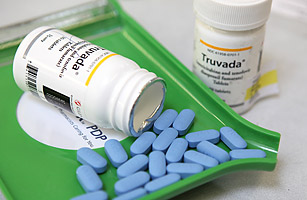
Antiretroviral drugs have turned the AIDS epidemic around, by thwarting the virus in HIV-positive patients. But new research suggests that this powerful treatment may have another benefit — as a weapon against infection in healthy individuals.
In a trial involving nearly 2,500 HIV-negative, but high risk, gay men in six countries, researchers found that a combination antiretroviral pill called Truvada reduced the risk of HIV infection by 44%, compared with placebo. When scientists looked more carefully at the study volunteers who took the medication most faithfully, on a daily basis, they found that the risk of contracting HIV was even lower — 73% lower than the placebo group.
More studies will need to confirm the benefit of antiretrovirals in the prevention of HIV, and public health experts warn that even if the results hold up, it would not replace the best method of prophylaxis: safe sex and consistent use of condoms. That's because the way so-called pre-exposure prophylaxis, or PrEP, works is to load up high-risk people with HIV-disabling antiretroviral drugs before exposure to the virus, which allows the medication to hit HIV as early as possible. But the drugs do not work as a vaccine would, by priming the immune system to actually prevent infection.